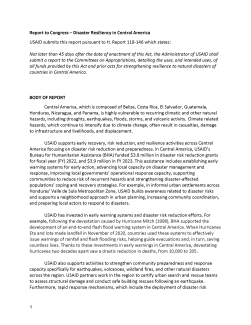USAID submits this report pursuant to H. Report 118-146 which states:
Not later than 45 days after the date of enactment of this Act, the Administrator of USAID shall submit a report to the Committees on Appropriations, detailing the uses, and intended uses, of all funds provided by this Act and prior acts for strengthening resilience to natural disasters of countries in Central America.
Central America, which is composed of Belize, Costa Rica, El Salvador, Guatemala, Honduras, Nicaragua, and Panama, is highly vulnerable to recurring climatic and other natural hazards, including droughts, earthquakes, floods, storms, and volcanic activity. Climate related hazards, which continue to intensify due to climate change, often result in casualties, damage to infrastructure and livelihoods, and displacement.
USAID supports early recovery, risk reduction, and resilience activities across Central America focusing on disaster risk reduction and preparedness. In Central America, USAID’s Bureau for Humanitarian Assistance (BHA) funded $3.8 million in disaster risk reduction grants for fiscal year (FY) 2022, and $3.9 million in FY 2023. This assistance includes establishing early warning systems for early action, advancing local capacity on disaster management and response, improving local governments’ operational response capacity, supporting communities to reduce risk of recurrent hazards and strengthening disaster-affected populations’ coping and recovery strategies. For example, in informal urban settlements across Honduras’ Valle de Sula Metropolitan Zone, USAID builds awareness related to disaster risks and supports a neighborhood approach in urban planning, increasing community coordination, and preparing local actors to respond to disasters.
USAID has invested in early warning systems and disaster risk reduction efforts. For example, following the devastation caused by Hurricane Mitch (1998), BHA supported the development of an end-to-end flash flood warning system in Central America. When Hurricanes Eta and Iota made landfall in November of 2020, countries used these systems to effectively issue warnings of rainfall and flash flooding risks, helping guide evacuations and, in turn, saving countless lives. Thanks to these investments in early warnings in Central America, devastating hurricanes two decades apart saw a drastic reduction in deaths, from 10,000 to 205.
USAID also supports activities to strengthen community preparedness and response capacity specifically for earthquakes, volcanoes, wildland fires, and other natural disasters across the region. USAID partners work in the region to certify urban search and rescue teams to assess structural damage and conduct safe building rescues following an earthquake. Furthermore, rapid response mechanisms, which include the deployment of disaster risk management specialists, allow USAID to respond to disasters induced by natural hazards within 48 hours across the region.

